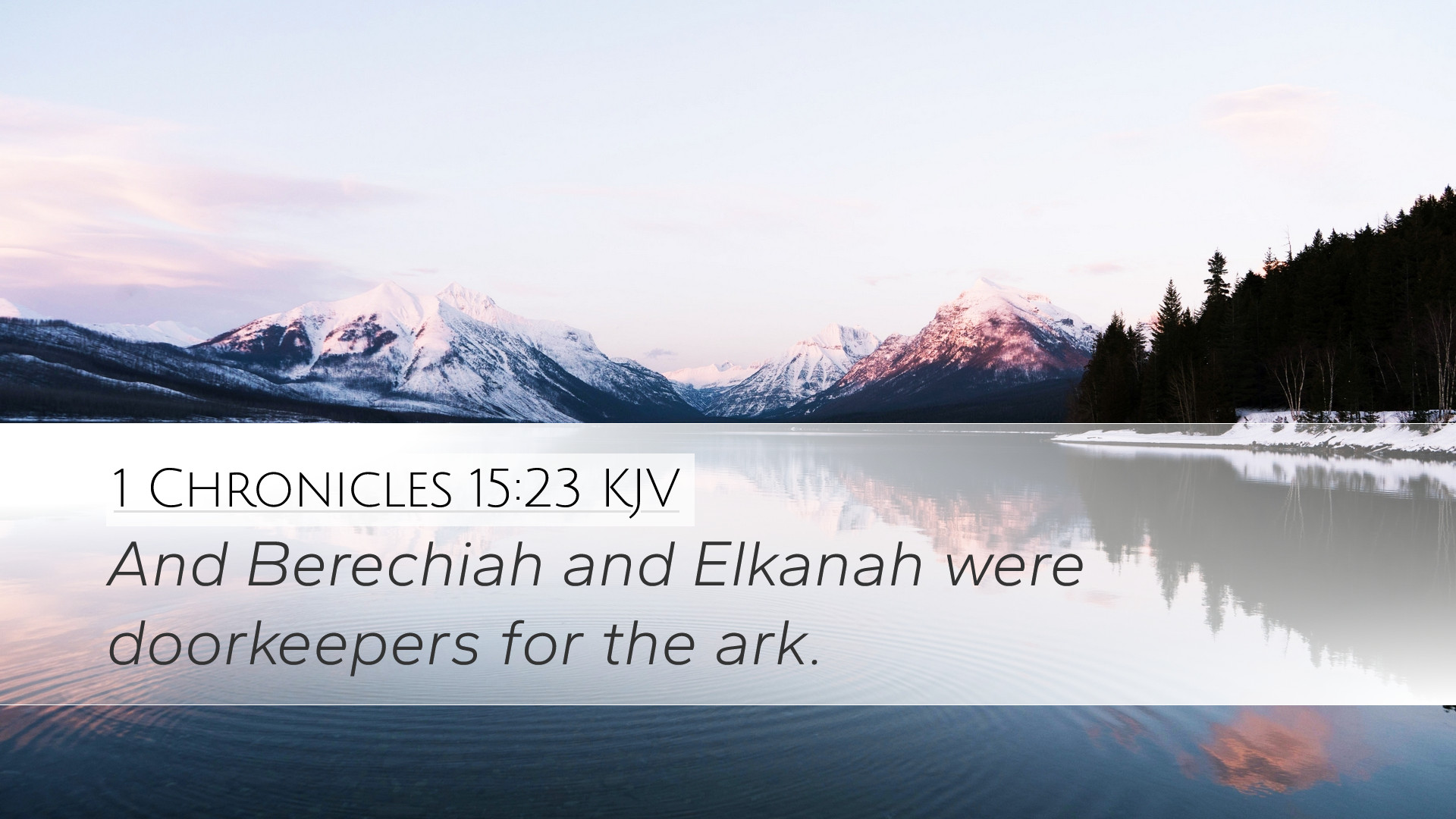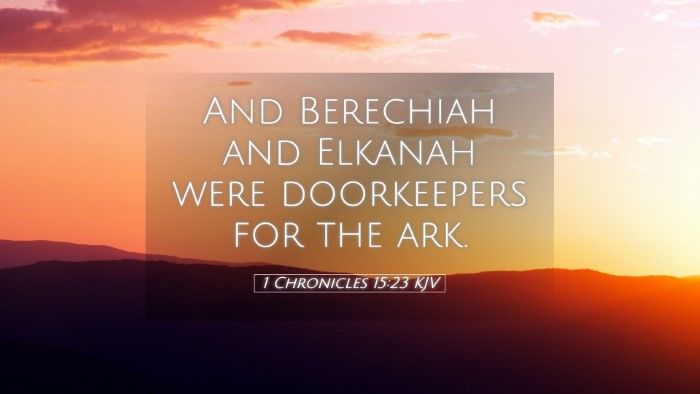Commentary on 1 Chronicles 15:23
This passage of scripture highlights the important role of the Levites in the context of worship and sacred assembly, particularly in relation to the transportation of the Ark of the Covenant. In 1 Chronicles 15:23, we read about the appointed duties of some of the Levites, specifically concerning the care and movement of the Ark. The verse states:
“Benaiah and Eliezer the priests were to blow the trumpets before the Ark of God; and Obed-Edom and Jehiah were to be gatekeepers for the Ark.”
Understanding the Significance
The Ark of the Covenant was not merely a relic; it was the very symbol of God's presence among His people. Thus, it was crucial for the Levites to execute their duties with reverence and precision, ensuring that God's commandments regarding the Ark were followed. This underscores the principle that proper worship involves the acknowledgment of God’s holiness and the adherence to His ordinances.
Insights from Matthew Henry
Matthew Henry addresses the organization and sanctity of worship in his remarks on this passage. He emphasizes:
- The Role of Priests: The priests, designated as Benaiah and Eliezer, had the responsibility to blow trumpets before the Ark. This act was significant as it served as a call to worship and a proclamation of God’s presence. The sound of the trumpets indicated that God was among His people and should elicit a response of reverence.
- Guardians of the Ark: The gatekeepers, Obed-Edom and Jehiah, perform an essential service. Their role as gatekeepers was not merely physical but symbolical; it represented the protection of sacred things and the safeguarding of worship practices. Henry illustrates that respecting the process set forth by God is a vital aspect of true worship.
Insights from Albert Barnes
Albert Barnes provides an additional perspective on the duties of the Levites. He remarks on the following aspects:
- Structure and Order: Barnes emphasizes the importance of order in worship. He explains that the designation of specific individuals for certain roles reflects a divinely ordained structure, conveying that God is a God of order, not chaos.
- The Role of Music in Worship: The blowing of trumpets by the priests, highlighted by Barnes, signifies the role of music and sound in worship. It reminds us that worship should engage the senses and elicit a communal response among the people, drawing them closer to God.
Insights from Adam Clarke
Adam Clarke adds depth to our understanding of the context surrounding this verse:
- Cultural Context of Worship: Clarke explains that the role of trumpeters in ancient Israel was not merely aesthetic; they were integral to the cultural practice of worship. The sound of trumpets would accompany significant religious events, marking the importance of the Ark's movement and the return of God's presence among His people.
- Symbolism of Gatekeeping: He further explores the spiritual implications of the gatekeepers' duties, drawing parallels to the necessity of safeguarding the sanctity of worship today. Just as the gatekeepers were entrusted with this role, so too are contemporary believers called to protect the integrity of the faith.
Theological Implications
This verse presents numerous theological reflections for pastors and scholars:
- Holiness of God: The way the Ark was treated and transported shows the high view of God's holiness and the seriousness with which His presence should be approached both in ancient Israel and today.
- Community and Worship: The appointed roles remind us that worship is both individual and communal. Diverse members of the community were involved in the worship process, reflecting the importance of each person's role in the body of Christ (1 Corinthians 12:12-27).
- Preparation for Worship: The meticulous preparation and roles assigned serve as a reminder that worship involves preparation—not just in physical terms, but also spiritually, as believers approach God with reverence.
Practical Applications
As we reflect on 1 Chronicles 15:23, several applications can be derived for contemporary worship contexts:
- Diligence in Worship: Modern worship leaders and church members can learn from the diligence shown by the Levites. Each role within the church should be approached with the understanding that they contribute to a larger worship experience.
- Engagement of the Congregation: The use of music and sound, as initiated by the priests, challenges contemporary churches to ensure that worship is engaging; it should invite participation from the congregation.
- Guarding the Sanctity of Worship: Just as the gatekeepers protected the Ark, modern believers are called to protect the sanctity of worship, guarding against distractions, irreverence, and actions that may detract from the worship of God.
Conclusion
In conclusion, 1 Chronicles 15:23 provides rich insights into the nature of worship, the significance of roles within the faith community, and the overarching theme of reverence for God's presence. The careful structuring of worship—illustrated by the roles assigned to priests and gatekeepers—serves as a model for churches today to emulate as they strive to honor God in all aspects of their worship.


